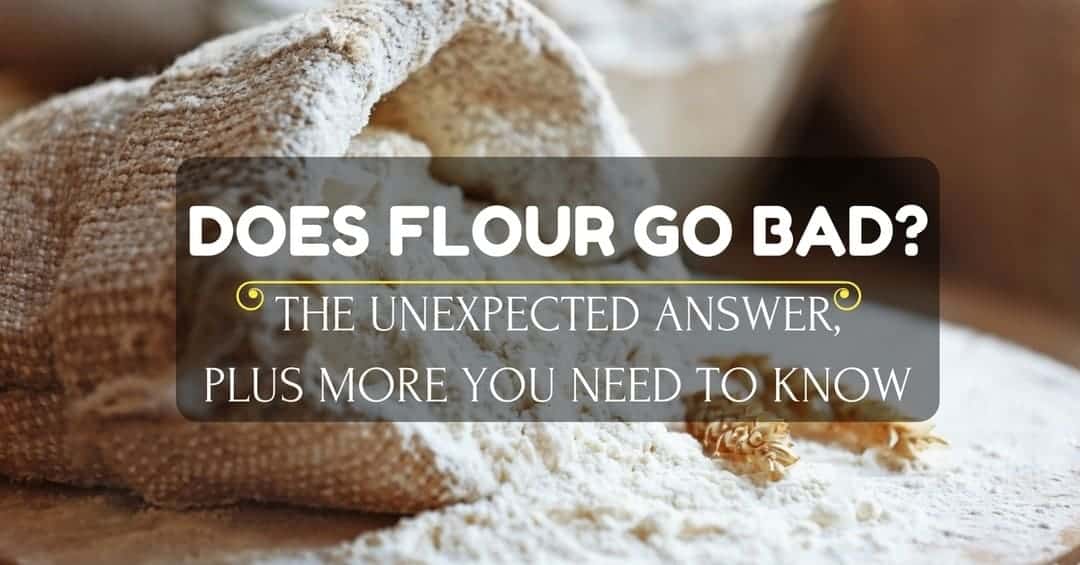If you're new to cooking, you might have asked yourself this question, "Does flour go bad?" You need to know the answer to this simple question because it's critical in baking. Using bad flour may affect the texture and structure of your finished product, especially for chewy cookies and bread.
I had dealt with this same problem before when I was planning to make bread and all I had was a one-year-old flour in my pantry. To help those with the same flour issue, let me share with you what I have learned so far.
More...
What Does Flour Do?

Flour is one of the main ingredients in baking. When combined with water, gluten is created from two particular proteins: glutenin and gliadin. Gluten is what provides the texture and structure to your dough and batter at room temperature.
Although a strong gluten structure is highly needed in yeast bread and chewy cookies, it may not be the same case with cakes, pastries, and quick bread because too much gluten will make the baked goods tough.
During baking, the moisture in the dough starts to gelatinize the starch, causing the formation of crumb and crust. The more moisture present in the dough, the crisper the crust of your bread due to the abundance of starch gel.
So, Does Flour Go Bad?

Yes, just like any other food, flour has an expiration date and can go bad. The shelf life of flour relies on how it's stored and the best-before-date reflected on its package. When properly stored, flour can still be used beyond its best by date.
According to American Preppers Network, the estimated shelf life for the following kinds of flour are:
- All Purpose Flour And Self-Rising Flour: 10-15 months in the pantry or 24 months in the refrigerator
- Bread Flour And Gluten Flour: 6 months in the pantry
- Instant Flour: 6-8 months in the pantry or about one year in the freezer
- Rice Flour: 5-6 months in the pantry or about one year in the freezer
- Whole Wheat Flour: 3 months in the pantry or six months in the freezer
- Buckwheat Flour And Spelt Flour: 3-6 months in the pantry or about one year in the freezer
- White Rice Flour: one year in the pantry or two years either in the freezer or refrigerator
Signs That The Flour Has Gone Bad

It's simple to determine if the whole wheat flour has gone bad because it will smell rancid. Because of some essential oil retained, whole wheat flour tends to deteriorate over time and develop a rancid odor. You can also check the taste. If the taste is sharp and moldy, then your fresh whole wheat flour has gone bad.
Another sign to watch out for is the existence of tiny bugs called weevils in the bag. Some people recommend freezing the bag for two days to kill the bugs, but it's safer to discard the flour bag straight to the garbage can. You should then sanitize your whole pantry because there are possibilities that the tiny bugs moved to other areas in the pantry.
To check if there are any tiny bugs in your flour, do these following steps:
- Get a clear glass and fill it up with flour.
- Press the flour together. What you'll get should be a flat surface slightly below the glass's rim.
- Let the glass stand in a warm and bright area for around 1-2 hours. You can tell that your flour is worm-infested if you find some very small larvae breaking the smooth surface.
Do you constantly get weevils in your pantry? Watch this video to find out how to keep them out!
Proper Storage Of Flour
All flour varieties can last longer if they're kept in a cool, dry place away from direct sunlight. Flour can be stored in the pantry, refrigerator, or freezer in a sealed container. You can extend the shelf life of whole grain flour in the fridge or freezer, but this is not suggested for white flour as it goes completely dry after its expiration date.
If your bag is unopened, you can store the flour in its original package or double seal it in a plastic bag. The container should be vapor-proof so the flour can't absorb the odors from other foods around. If your container has no lid, you can seal it in a container with a cling wrap over it.
Final Thoughts

If someone asks you, "Does flour go bad?", you can now answer with confidence "Yes, it does." Flour can go bad over time and can expire as well. Some signs of spoilage include a rancid smell, a moldy taste, and existence of tiny bugs.
For any questions or suggestions, you can let us know in the comments section. Don't forget to share this article with your friends and family if you liked it!

